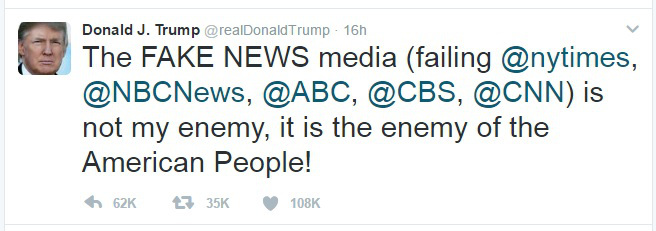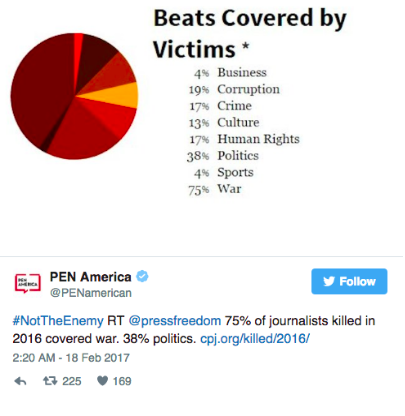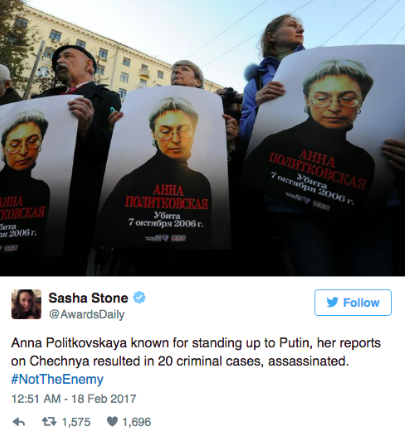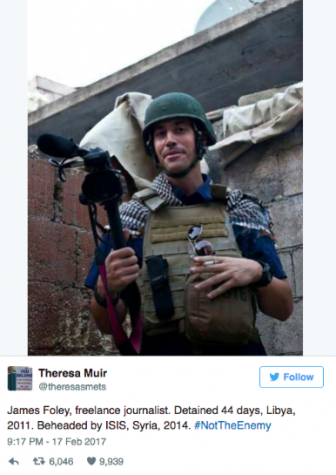Trump v. Journalists
jour·nal·ism
/ˈjərnlˌizəm/
noun
- the activity or profession of writing for newspapers, magazines, or news websites or preparing news to be broadcast.
- the product of the activity of journalism.
- “an art critic whose essays and journalism are never dull”
The world needs journalists.
In a world currently filled with “alternate facts” and opinions in place of the truth, the proven fact is the information that needs to be shared.
Journalism in its most basic form is getting important information to people who need it. With the amount of technology in the world right now, information is becoming more and more accessible. However, information can be interpreted in many ways. Journalists simplify and translate that information.
The founding fathers protected the rights of journalists in the First Amendment: “Congress shall make no law…abridging the freedom of speech, or of the press…and to petition the Government for a redress of grievances.” The creators of our nation felt the need to guarantee the rights of the press to be able to share valuable information.
Recently, that right has been under attack.
With the current President, Donald Trump, good journalists and truth tellers are needed more than ever.
Mr. Trump has repeatedly attacked journalists.
In recent tweets, President Trump wrote that the nation’s news media “is the enemy of the American people.”
Other world leaders who have declared press as an enemy of the state: Hugo Chavez, militant president of Venezuela; Vladimir Putin, president of Russia; and Kim Jong-Un, dictator of North Korea.
Just the day before the tweet was released, Mr. Trump devoted much of a 77-minute news conference to criticizing his press coverage.
Defendants of the media were quick to respond on Twitter by starting the trending hashtag #NotTheEnemy. Tweets involved mentions of many journalists who have lost their lives while reporting, in addition to journalists who broke headline stories such as the Watergate Scandal.
Some examples of #NotTheEnemy:
In an interview with The New York Times in January, Steve Bannon, Chief White House Strategist, called reporters the “opposition party” and said “the media should be embarrassed and humiliated and keep its mouth shut and just listen for a while.”
Before Bannon was the Chief White House Strategist, he was the chair of the far-right Breitbart News. Breitbart News is known to periodically publish falsehoods and conspiracy theories, in addition to intentionally misleading stories.
Carl Bernstein was one of the journalists uncovered the Watergate scandal. According to a New York Times article Bernstein said “Oh boy,” after a reporter read him Mr. Trump’s tweet. “Donald Trump is demonstrating an authoritarian attitude and inclination that shows no understanding of the role of the free press,” Bernstein added.
Historians have been quick to point out similarities between Mr. Trump and former President Richard Nixon, who in 1972 told his national security adviser, “The press is the enemy.”
“[President’s Trump’s language] may be more insidious and dangerous than Richard Nixon’s attacks on the press,” Bernstein said. “But there is a similarity in trying to divide the country, and make the conduct of the press the issue, instead of the conduct of the president.”
The comparison between President Nixon and Trump is a scary one to make, but not a far stretch at all.
There was a constant demand for good journalists during the Nixon administration. However now, with “alternate facts” circling around and tweets instead of press conferences, there is an urgent need for journalists and truth tellers.

Cammi is in her fourth year on staff and is a senior at Community. This is her second year making up 1/4 of the print editor-in-chief team. When not working on The Communicator, she can be found playing golf and basketball for Skyline, lawyering at Mock Trial, singing camp songs off key at Camp Al-Gon-Quian or climbing trees. Cammi’s favorite part of journalism is when an interviewee says something special or powerful out of the blue. Two averagely fun facts about Cammi are that 1 ) she is scared of lightning but loves rain and 2) her favorite shape is a triangle.












